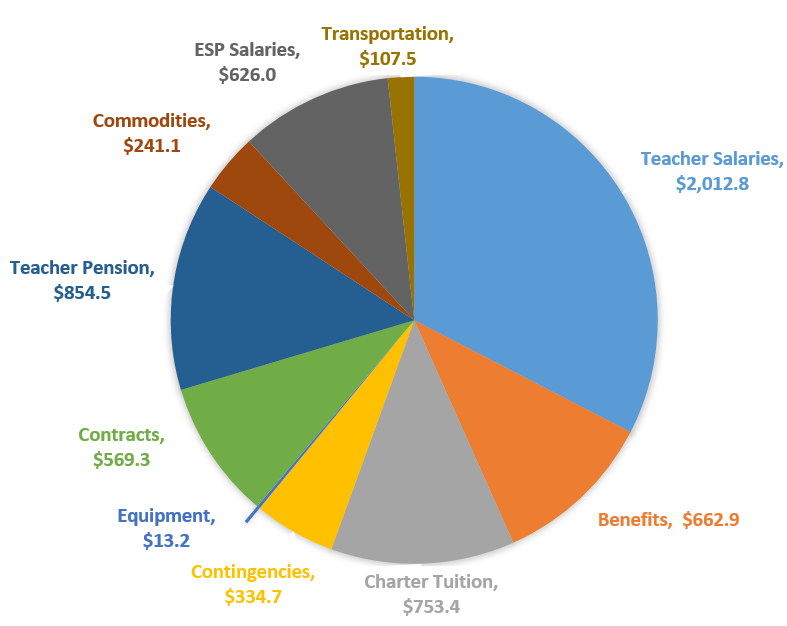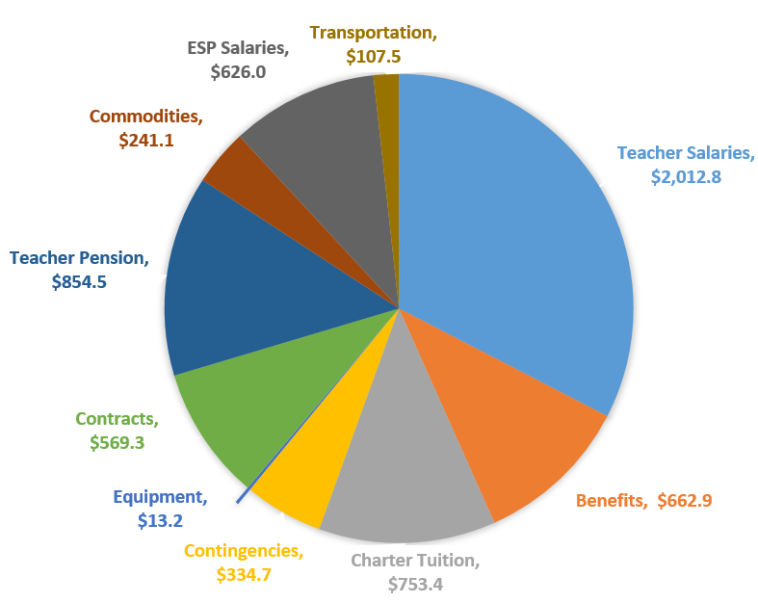
Chicago Public Schools Lavish Vacations Under Scrutiny
Recent reports have raised serious concerns about how Chicago Public Schools (CPS) has managed its travel budgets. Taxpayer dollars, to the tune of $23.6 million over six years, have been spent on extravagant vacations that include stays at upscale hotels, luxury trips overseas, and extravagant conferences under the guise of professional development. This opinion editorial takes a close look at the tangled issues behind CPS’s vacation spending and asks critical questions about oversight, fiscal responsibility, and the true purpose of these trips.
The Taxpayer’s Dilemma: Balancing Professional Growth and Fiscal Discipline
The CPS travel scandal exposes an awkward clash between two competing priorities: investing in professional development for educators and ensuring responsible use of limited taxpayer dollars. On one hand, professional growth opportunities can be essential—critical, even—for improving teaching quality, particularly in a system where only 2-in-5 students reportedly read at grade level. On the other hand, when funds intended to help students close academic achievement gaps are funneled into outings at 5-star hotels and international resorts, the public trust is seriously undermined.
Many community members are left asking: why choose lavish vacations over classroom resources? After all, CPS is already grappling with intimidating challenges, including low performance rates in reading and math. The diversion of funds away from classrooms to fund extravagant travel seems, at best, like a misguided policy decision and, at worst, an irresponsible misallocation of resources intended to support students.
Scrutinizing the Approval Process and Travel Policies
One of the most troubling aspects of this situation lies in the administration’s weak oversight and ambiguous travel policies. Reports indicate that much of the $23.6 million spent on travel was executed without proper approval—events masquerading as professional development conferences allowed employees to enjoy personal gain at the expense of taxpayers. The CPS Office of Inspector General has described the travel rules as “lax, vague, inadequate and unenforced.” This lax approach has led to a culture where spending limits are not respected and expensive trips become routine.
A closer look at the nitty-gritty reveals that many expenses were simply not justified. For instance, a teacher’s seven-day trip to a luxury Hawaiian resort costing $4,700 under the pretext of professional development raises significant concerns about oversight and accountability. Similarly, principals and other staff members have been recorded booking hotels at rates exceeding $900 per night and resorting to limo services for airport transfers—all decisions requiring more careful consideration if these trips are to be defended as necessary professional development expenses.
Misguided Professional Development: From Out-of-Town Conferences to Luxury Retreats
It is worth pondering whether these luxury trips can truly be considered professional development when the primary outcome appears to be personal leisure. The conference circuit has taken on a new meaning when expensive trips—ranging from domestic conferences spanning cities such as New York, New Orleans, Orlando, and Dallas to international trips to Finland, Estonia, Egypt, and South Africa—are cloaked under the promise of improving educational practices. In many cases, seminars stretching beyond scheduled dates, added luxury accommodations, and optional tourist activities have diluted the promise of genuine professional improvement.
When professional development is pushed to the fringes as a pretext for personal vacations, both the educators and the students suffer. Educational institutions are tasked with the responsibility of tightening travel rules and replacing unnecessary expenses with more cost-effective local options. By steering through a path of accountability, CPS can ensure that employee training is both beneficial and economical rather than a loophole for extravagant getaways.
Accountability Gaps and the Culture of Entitlement
What has perhaps contributed most to this spending scandal is the overall culture entrenched within the institution. The CPS Office of Inspector General’s report has painted a picture of a working environment rife with a sense of entitlement. When conferences are easily accessible—a virtual seminar attracting only one attendee or a multi-day retreat less than 50 miles from the schools turning into a spa resort experience—it raises uncomfortable questions about the priorities of those entrusted with public funds.
Consider these key points:
- Multiple instances of unapproved out-of-state travel, including repeated conferences in destinations like Las Vegas and a particularly high-cost lesson packed schedule for a single principal.
- Instances where travel expenses were inflated by booking extra nights without proper oversight, even to celebrate personal milestones such as anniversaries.
- Reports of more than $142,000 in funds used for international travel that included optional tourist activities like hot air balloon rides, camel rides, and visits to bazaars.
These examples illustrate how fine lines between professional development and personal leisure are being blurred. The culture of entitlement, paired with significant oversight gaps, has led to a scenario where the trust of the public is jeopardized.
International Trips Versus Local Opportunities: Finding a Balanced Approach
One of the more contentious decisions made by CPS was to allocate a significant portion of its travel budget toward international trips. More than $142,000 was spent on trips to countries such as Finland, Estonia, Egypt, and South Africa. While such trips can offer a rich cultural tapestry and diversified learning, their efficiency in enhancing classroom behavior and student performance is highly debatable.
When faced with the choice between overseas travel and local professional development, it is essential to take a closer look at what best serves the students. International trips can certainly provide exposure to different cultures and educational practices, but the return on investment for these activities remains questionable. Without robust evaluation methods and strict approval processes, it is challenging to justify these high expenditures.
Local opportunities may offer just as much in terms of innovative ideas and networking while ensuring that the money stays closer to home. Choosing venues in and around Chicago for conferences and workshops not only reduces costs but also supports the local economy. More importantly, it permits a more direct focus on improving the educational environment in familiar settings.
Financial Priorities: Redirecting Funds to Classroom Needs
A central argument in this debate is whether CPS should continue to spend heavily on expensive travel when much-needed funds could instead be allocated to direct classroom improvements. In an education system struggling with low reading and math proficiency, every dollar counts. Investing in classroom technology, teacher training sessions held locally, and enhanced educational materials might yield far more significant improvements than a week at a luxury resort.
It is neither unreasonable nor radical to suggest that money currently spent on extravagant trips should be redirected to close the pandemic achievement gaps. With federal funds intended to help struggling students in the aftermath of an extended period of academic disruption, CPS had a window of opportunity to address the underlying issues in education. Instead, these funds were partly used to support personal benefit trips that appeared to serve less as developmental tools and more as extravagant leisure activities.
Policy Recommendations: Laying the Groundwork for Change
To restore public confidence and ensure that taxpayer dollars are used appropriately, several policy changes are crucial. The CPS administration must implement tangible reforms designed to figure a path toward more accountable spending and effective professional development. Here are some recommended policy changes:
- Revising Travel Guidelines: Create clear, strict policies that outline which types of travel can be considered legitimate professional development. These guidelines should feature set daily limits on hotel and airfare expenses, with any amount exceeding these limits being the personal responsibility of the employee.
- Prioritizing Local Opportunities: Require that employees choose conferences and professional development events within Chicago or its suburbs whenever possible, reducing excess costs tied to out-of-town trips.
- Ensuring Pre-Approval Procedures: Enforce a robust pre-approval process for all travel. No trip should be undertaken without a thorough review and an official sign-off from a designated administrator.
- Utilizing Vacant Buildings: Convert unused district facilities into venues for professional development workshops. This move not only saves money but also fosters community engagement within the district.
- Transparent Reporting: Mandate regular and public reporting of travel expenditures so that taxpayers can track how their money is being used, thus increasing transparency and accountability.
These proposals are not just fiscal measures; they are steps toward rebuilding trust. The measures are super important to demonstrate that the administration is not simply using taxpayer funds as a vacation pool for personal gain.
Learning from Past Errors: A Call for Institutional Reform
The problems identified are not isolated incidents but rather symptomatic of a deeper, systemic pattern within CPS that has evolved over time. A culture that allows over-budget spending and unchecked luxury trips trends toward complacency and erodes the very values of public service. It is high time for CPS to take a harder look at its policies to avoid repeating these expensive mistakes.
The pattern is clear: when oversight is weak and the rules are written in confusing, tangled language, there is ample room for misuse of funds. The faculty and administrators must work together to steer through these challenges, ensuring that expenditures are closely tied to measurable improvements in the educational experience for students.
Examining the Impact on Student Outcomes
Beyond the financial implications, one must consider the direct impact on student achievement. With only 40 percent of CPS students reading at grade level and just 25 percent performing proficiently in math, it is hard to justify extravagant spending on travel when resources are desperately needed in classrooms.
When reality sets in for students whose basic educational needs remain unmet, the use of federal and local funds in this way becomes even more suspect. The funds that could be harnessed to address these overwhelming issues have instead been allocated in ways that do little to combat the real struggles faced by students and teachers on a daily basis.
A focus on tangible educational returns—such as teacher training that relies on clear, accessible methods and investments in instructional resources—stands as an obvious alternative. The disparity between what was needed in classrooms and what was spent on luxury vacations is stark and demands a reevaluation of spending priorities.
Public Trust and the Need for Greater Transparency
At the heart of the matter lies the erosion of public trust. Taxpayers expect the money collected in taxes to improve the quality of their children’s education and to support community infrastructure—not to subsidize extravagant trips for employees. With the current policies and oversight mechanisms failing to prevent abuse, skepticism among parents and taxpayers alike is both natural and justified.
It is incumbent upon CPS to restore confidence by ensuring that every expenditure is justified and has a direct, measurable impact on improving education. Enhanced transparency through regular audits, public disclosures, and accountability reviews will help bridge the widening trust gap between the public and school administration.
Experiences from Similar Urban School Systems
Other urban school districts across the nation have faced similar challenges and have often instituted reforms to tighten their travel policies and budget management processes. For example, districts in major cities have implemented strict travel guidelines, mandated local conferences, and used digital auditing tools to monitor expenses more effectively.
Comparing these practices with the current state of CPS can highlight potential solutions. Many successful districts have reined in excessive spending by establishing clear rules about allowable expenses and ensuring that any professional development aligns directly with clear educational outcomes, rather than serving as an extension of leisure or personal enrichment.
Incorporating lessons from these experiences into CPS’s framework could prove immensely beneficial. By learning from the successes and mistakes of other urban districts, CPS may be able to figure a path out of this maze of excessive spending and misallocated funds.
Looking Forward: Implementing Change and Restoring Confidence
To remedy the current situation, it will be necessary for CPS leadership to adopt a proactive approach. The travel freeze announced by CPS and statements from Interim Superintendent and CEO Macquline King serve as initial steps. However, a temporary halt on non-approved travel is not enough on its own. Comprehensive and sustained changes are required to ensure that every discretionary dollar contributes to improved student outcomes.
A clear, transparent, and strictly enforced set of guidelines for travel and professional development is essential. Senior administrators must take individual responsibility for overseeing these changes and ensuring that all faculty and staff understand the new limits. Such organizational reforms require a willingness to look into the fine points of policy, reexamine entrenched practices, and make the necessary adjustments even when the process feels overwhelming.
In addition, regular training sessions should be introduced to help staff understand the new policies and the importance of staying within approved expenditure limits. By breaking down the confusing bits of the previous policy into clear, simple guidelines, CPS can help its employees better manage their travel budgets.
Steps Toward a Culture of Responsibility and Integrity
Beyond the technical changes, there is a crucial need for a broader cultural shift within CPS. Educational institutions are built on trust, and this trust is often undermined when the fine details of policy are misused for personal interests. A culture of responsibility, where every employee understands that misusing funds can detract from the very mission of public education, is essential.
Here are several measures that could help foster such a culture:
- Regular Ethics Training: Implement mandatory sessions centered on ethical spending and the proper use of taxpayer funds. These sessions can help remind staff of their duty to prioritize student learning and community support.
- Peer Review Committees: Establish internal review panels that periodically assess travel and expenditure reports. This peer oversight can serve as an additional check against unnecessary expenses.
- Reward Systems for Fiscal Responsibility: Recognize and reward departments or individuals who consistently adhere to new guidelines and demonstrate a commitment to cost-effective professional development.
- Feedback Channels: Create clear, anonymous channels through which staff, parents, and other stakeholders can report concerns about spending. This transparency ensures that misuse is caught and corrected as early as possible.
The road to rebuilding trust is not short or easy. It involves careful examination of current practices, an honest assessment of what has gone wrong, and a commitment to change that starts at the very top of the organization.
Conclusion: Investing in Education, Not Exploiting It
In summary, the story of $23.6 million spent on luxury travel by Chicago Public Schools brings to light a number of concerning issues: weak oversight, ambiguous travel policies, and a culture that too often blurs the line between professional development and personal luxury. The situation serves as a reminder that the effective management of public resources requires both transparent policies and a firm commitment to the core mission of education.
When taxpayer dollars are used to fund expensive vacations rather than to directly support classroom needs, the students suffer. The challenge before CPS is to build a system that rewards fiscal responsibility and transparent decision-making, ensuring that every dollar spent furthers the goal of quality education.
It is essential that we, as a community, insist on clear, accountable, and efficient use of public funds. The proposals outlined here—from revising travel guidelines to fostering a culture of responsibility—offer a blueprint for a more balanced and trustworthy approach to professional development spending. Only by choosing to invest in straightforward, cost-effective solutions can CPS truly fulfill its mission to serve its students and restore the public’s faith in its administration.
Ultimately, the path forward lies in a commitment to reform that not only addresses the current excesses but also lays the foundation for a future where every decision is made with the best interests of our children in mind. It is a call to action: for administrators to take the wheel, for policymakers to get into the fine points of oversight, and for taxpayers to demand nothing less than an education system that values its students above all else.
Originally Post From https://www.illinoispolicy.org/taxpayers-pay-23-6m-for-chicago-public-schools-vacations/
Read more about this topic at
Uncovered: Wasteful Government Spending
Waste Watch: Five Alarming Examples of Government Waste …


